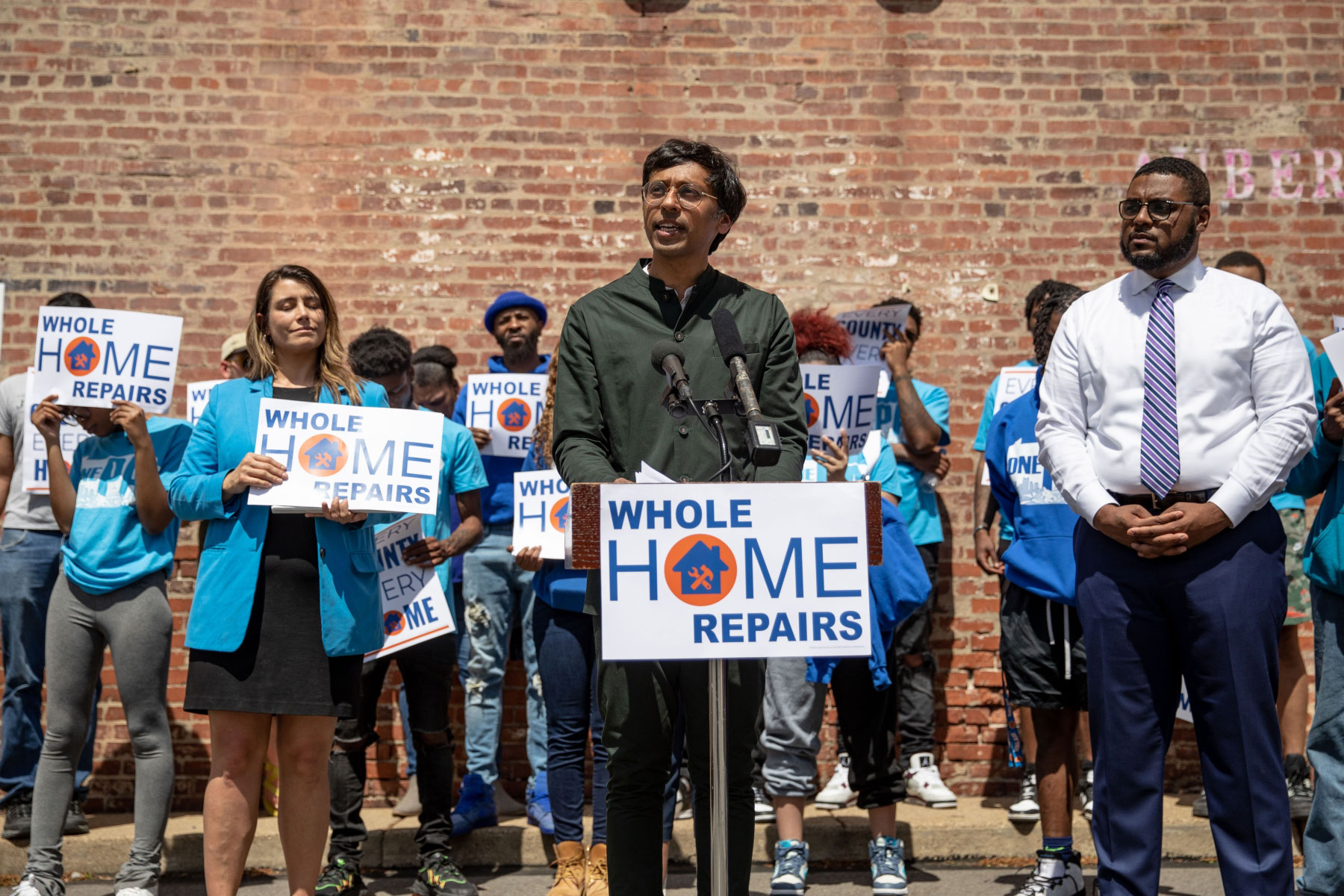General Assembly
The Year in Review
Our top stories of 2024 and where the issues stand

A rendering of the Philadelphia 76ers arena proposed for the Market East area near Center City. City of Philadelphia
From the Sixers and SEPTA to skill games and broadband, there was no shortage of flashpoint issues in the Keystone State in 2024.
To close out the year, City & State is recapping some of its biggest stories of the year and providing updates on what to watch for in the New Year.
76 Placement

Teambuilding and long-term success are among the key questions surrounding the Philadelphia 76ers – not only on the court, but off it as well. Development of a $1.3 billion arena in the Market East area near Center City dominated City Council discussions at the end of the year, with the potential impacts of an arena on Chinatown and the surrounding neighborhoods – as well as the demands it would place on a struggling SEPTA system – continuing to drive the narrative.
Despite vociferous backlash from community groups and advocates in the Chinatown area, Mayor Cherelle Parker announced in September that her administration had reached an agreement with the team to move ahead with the arena development, setting the stage for City Council to pass the zoning legislation and other bills needed to get the project across the finish line.
Negotiations were held up mainly over the team’s proposed $50 million community benefits agreement, an investment well below what some lawmakers and community advocates believe is needed to equitably ensure Chinatown and the surrounding neighborhoods aren’t negatively impacted by the project.
The CBA’s final figure initially held up the vote on the arena-approving legislative package, causing Council to delay the Committee of the Whole vote twice on Dec. 11 before finally reaching a deal the following morning.
Meeting once again with a boisterous, sharply divided crowd in the chamber, Council gave initial approval to an arena deal – including a $60 million CBA – on Dec. 12, setting the stage for it to be approved by the end of the year.
The $60 million CBA includes $17.5 million for a new special services district around the arena, $5 million in aid for impacted businesses and $3 million for a new “neighborhood security substation.” It also includes other investments in parks and recreation, apprenticeship, workforce, and business grant programs.
The final vote was no less dramatic, as arena opponents locked arms on the council floor and were forcibly removed from the area in handcuffs after refusing to stop the sit-in protest. And a week after giving initial approval, Council gave the project the final greenlight Dec. 19 – passing an arena development proposal that could usher in a new era not only for the Market East area near Chinatown, but for Philadelphia’s economy.
Ultimately, Council and the team reached a deal on the $60 million deal – well below what community members and council members wanted, but above the original $50 million proposal.
Opponents, including leaders of the No Arena Coalition, spoke outside of City Hall after the vote, calling it a “searing indictment of the poor leadership” displayed by City Council.
“It was shocking to see Council leadership declare a bottom dollar figure of $100 million and completely capitulate to pressure less than 12 hours later,” the No Arena Coalition said in a statement. “We have wasted months of time and countless hours of hearings for barely any change in a deal that was written by the developers more than two years ago. It's an embarrassing indication of the lack of strategic and tactical skills from a largely rookie Council who got played.”
Scoring Skill Games
In 2024, whether to regulate and tax skill gaming machines remained a hot topic of conversation in the halls of the state Capitol and beyond. As budget negotiations heated up in the spring and summer of this year, Capitol-watchers wondered whether this would be the year that skill games get codified in state law and provide a new revenue stream for the state. Ultimately, that didn’t occur, but it didn’t stop discussions around regulating the machines from continuing.
Skill games, which are prevalent in bars, fraternal clubs and convenience stores, fall into a bit of a legal gray area. Courts have determined that winnings are based on a player’s skill at a particular game rather than by chance. That distinction has led courts in the commonwealth to determine that skill games fall outside of the state’s Gaming Act, and are thus not subject to the same regulations and taxes as slot machines.
Democratic Gov. Josh Shapiro and state Senate Majority Leader Joe Pittman both signaled an interest in taxing and regulating the games, with potential revenues directed toward public transit and infrastructure projects.
“I have made it clear that if we’re having a transit discussion, that discussion cannot occur without infrastructure as well. We have never addressed transit or infrastructure without dealing with both of them, and so I don’t see a pathway to deal with just transit. If we’re going to deal with both issues, I don’t see where we find revenue through existing streams to meet those interests,” Pittman told City & State in an interview earlier this year. “So I have suggested that the only potential revenue stream that I see out there of any magnitude is games of skill – and if a portion of that could be used for transit and infrastructure, I think it’s at least worth considering.”
While some public officials have leaned toward taxing and regulating the machines, especially since they are already prevalent in different types of businesses across the state, others have looked to place restrictions on them. Philadelphia Mayor Cherelle Parker signed a bill into law in April that bans the games from being located in stores, but allows skill games in casinos and bars.
At a statewide level, it’s unclear how Shapiro’s recent decision to use federal highway project funds to help the Southeastern Pennsylvania Transportation Authority weather financial hardships will impact negotiations on transport funding and infrastructure. But as for the debate over regulating skill games, the Pennsylvania Supreme Court could play an important role.
In June, the court agreed to take up an appeal that asks the court to determine whether skill games can be classified as illegal gambling devices if they are programmed to provide winnings based on skill, rather than chance. The court has yet to rule on the appeal.
Saving SEPTA

With the Philadelphia region’s transit authority continuing to struggle financially, SEPTA’s looming “death spiral” will continue to make headlines as officials weigh possible short- and long-term funding solutions.
SEPTA recently resorted to instituting fare hikes and proposing severe service cuts to help service its $240 million annual budget deficit after exhausting its federal COVID-19 relief funds. Lawmakers in Harrisburg attempted to adjust the way the system is funded by the state, with the state House, led by Democrats, passing legislation in October that would increase state funding transfers for public transportation across the commonwealth.
After the House proposals saw no movement in the Republican-led state Senate, Democratic Gov. Shapiro took the issue into his own hands, striking a deal between the state Department of Transportation, local officials and the transit authority to transfer $153 million from seven highway projects across the state to uplift SEPTA for the next six months.
Speaking at a press conference announcing the funding transfer, Shapiro said the decision to direct federal dollars to SEPTA was done to “create a bridge – some time and space for the House and Senate to be able to work together, to come together on this issue of funding mass transit.” And while SEPTA got funding in the short term, the governor said that, heading into a new legislative session in Harrisburg, “long-term, sustainable funding for mass transit is really unfinished business for all of us.”
Broadband buildout

Expanding existing broadband internet networks – and the utilization of two federal programs – were two major topics at the local and national level during 2024.
In the spring, the Pennsylvania Broadband Development Authority announced that a significant chunk of the $279 million that Pennsylvania is set to receive through the federal Broadband Infrastructure Program had been approved for 53 development projects across 42 counties.
PBDA Executive Director Brandon Carson said the projects, which consist of both local line extensions and larger regional infrastructure buildouts, would connect 40,000 homes and businesses across the state to broadband internet.
A $20 million grant program for areas like Philadelphia, included in the $279 million allocation, seeks to increase access to digital devices that will enable an estimated 12,000 individuals annually to participate in work, education and health monitoring activities.
Stephen Benjamin, White House Senior Advisor to the President and Director of Public Engagement, said the federal focus on broadband accessibility is part of an effort to improve what he called “21st-century” infrastructure.
“(We’re) trying to make sure that nothing stands in the way – from putting fiber in the ground (and) putting devices in people’s hands to making sure accessibility is affordable,” Benjamin told City & State. “We’re going to focus on working families doing their very best to participate in the American dream, and you have to do that by building the economy from the middle out and bottom up.”
More recently, PBDA announced that the first round of applications for the Broadband Equity, Access and Deployment Program, known as BEAD, will be accepted between November 2024 and January 1, 2025. On top of the BIP funding, the commonwealth is slated to receive $1.16 billion through the BEAD program to continue infrastructure expansion.
Internet service providers can help get coverage for the cost of broadband deployment to unserved and underserved communities in what have been extremely high-cost locations due to terrain and accessibility. The program will consist of two 60-day application periods for eligible entities to apply for funds to construct high-speed internet networks in areas that lack service.
Whole-Home Repairs

A home repair program that once passed as a landmark bipartisan initiative failed to receive funding in this year’s state budget, disappointing many county officials and housing and energy advocates – and leaving many to wonder about future funding for the high-demand program.
The commonwealth’s Whole-Home Repairs program, championed by state Sen. Nikil Saval, originally received $125 million in funding in 2022 to help property owners repair and weatherize their homes and to support training and pre-apprenticeship programs. The bipartisan legislation quickly garnered attention and an abundance of applications from residents and property owners across Pennsylvania seeking grants and forgivable loans to repair and modernize their properties.
The program’s popularity went beyond the state’s borders: U.S. Sen. John Fetterman introduced a federal version of the Whole-Home Repairs legislation and several states proposed similar programs modeled after the commonwealth’s.
Shapiro was also a major supporter of the program, proposing another $50 million investment in the program in his budget address and going around the commonwealth to promote its impact in rural and urban areas.
Despite its popularity, the future of the program remains uncertain. Both Shapiro’s office and state Senate Majority Leader Joe Pittman recognized lawmakers’ focus on education funding and human service programs without directly addressing the possibility of further funding Whole-Home Repairs.
Heading into 2025, Democratic lawmakers are hopeful the issue of affordable housing – and Whole-Home Repairs – will be top of mind in Harrisburg. Saval’s office told City & State it will continue to fight to secure Whole-Home Repairs funding and “expand its benefit to communities throughout the commonwealth,” noting that there are an estimated 20,000 people on repair waiting lists across the state.
